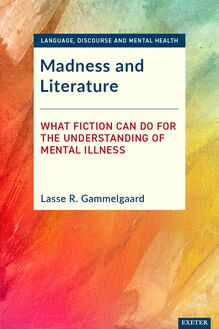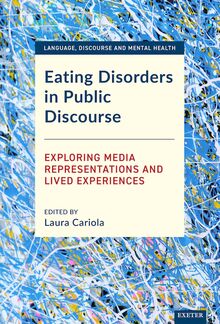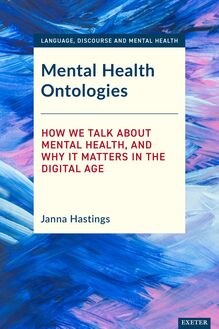Eating Disorders in Public Discourse , livre ebook
193
pages
English
Ebooks
2023
Vous pourrez modifier la taille du texte de cet ouvrage
Obtenez un accès à la bibliothèque pour le consulter en ligne En savoir plus
Découvre YouScribe et accède à tout notre catalogue !
Découvre YouScribe et accède à tout notre catalogue !
193
pages
English
Ebooks
2023
Vous pourrez modifier la taille du texte de cet ouvrage
Obtenez un accès à la bibliothèque pour le consulter en ligne En savoir plus
Publié par
Date de parution
24 janvier 2023
Nombre de lectures
1
EAN13
9781804130100
Langue
English
Eating disorders remain little understood by the public, and sensationalist stories in the media have done little to dispel simplistic and reductionist perspectives. This edited volume uses a range of language-centred approaches to provide much needed critical in-depth analysis and interdisciplinary synthesis.
The book brings together researchers from a variety of disciplinary backgrounds – including communication and information studies, journalism, linguistics, mental health, nursing, psychology and public health – in a collective endeavour to explore the complex relationship between eating disorders, public discourse and lived experiences. Topics tackled include the use of stigmatising narrative frames, stereotypes and metaphors; identity construction in online spaces; the ways in which individuals affected by eating disorders interpret media representations; and how parents write about their experiences of caring for children with eating disorders. The volume synthesises evidence from a range of data types, including UK and international newspapers, social media, online communities, blogs and forums, apps and in-depth interviews, and reflects a variety of cultural perspectives, including those held in the United States, the UK, Spain and Turkey. It will be of interest to academics, practitioners, students, mental health advocates, and anyone interested in how we make sense of eating disorders.
Introduction Laura A. Cariola
DOI: 10.47788/BASF7279
Part I Traditional Media and Public Discourse
1. Eating Disorder Metaphors in the American and Spanish Press Carolina Figueras Bates
DOI: 10.47788/QWOM4518
2. Animal Metaphors in Women’s Magazines: Their Potential Link with Eating Disorders Irene López-Rodríguez
DOI: 10.47788/HKAQ8861
3. Challenging the Stigma of a ‘Woman’s Illness’ and ‘Feminine Problem’: A Cross-Cultural Analysis of News Stories About Eating Disorders and Men Scott Parrott, Kimberly Bissell, Nicholas Eckhart and Bumsoo Park
DOI: 10.47788/LXVK2554
4. Representations of Anorexia Nervosa in National Media: A Frame Analysis of the UK Press Matt Bowen and Rhian Waller
DOI: 10.47788/UBYL4471
5. Representations of Eating Disorders in Turkish News Media Hayriye Gulec
DOI: 10.47788/UPWL9354
6. Experiencing Newspaper Representations of Eating Disorders: An Interpretative Phenomenological Study Laura A. Cariola and Billy Lee
DOI: 10.47788/XATI1798
7. Narrative Experiences of Social Media and the Internet from Men with Eating Disorders Gareth Lyons, Sue McAndrew and Tony Warne
DOI: 10.47788/DBCF4677
Part II Participatory Media and User-Generated Discourse
8. Online Negative Enabling Support Group (ONESG) Theory: Understanding Online Extreme Community Communication Promoting Negative Health Behaviours Stephen M. Haas, Nancy A. Jennings and Pamara F. Chang
DOI: 10.47788/PISN2308
9. Eating Disorder Discourse in a Diet and Fitness App Community: Understanding User Needs Through Exploratory Mixed Methods Elizabeth V. Eikey, Oliver Golden, Zhuoxi Chen and Qiuer Chen
DOI: 10.47788/DCZA4511
10. Using Qualitative and Mixed-Methods Approaches to Investigate Online Communication About Eating Disorders: A Reflective Account Dawn Branley-Bell
DOI: 10.47788/QSFW4482
11. ‘I’ll Never Be Skinny Enough’: A Fantasy Theme Analysis of Pro-Anorexia Discourse Allyn Lueders
DOI: 10.47788/SDQF1133
12. Lived Experiences of Parents Raising Children with Eating Disorders: A Thematic Analysis Emma O’Rourke and Laura A. Cariola
DOI: 10.47788/MMRH9260
13. ‘Anorexia is Seen as a GOOD Thing When You’re Fat!’: Constructing ‘Eating Disorders’ in Fat Acceptance Blogs Wendy Solomons, Kate Davenport and Joanne McDowell
DOI: 10.47788/UHLM5757
Discussion
Index
Publié par
Date de parution
24 janvier 2023
EAN13
9781804130100
Langue
English
Eating Disorders in Public Discourse
Language, Discourse and Mental Health
Series Editors :
Laura A. Cariola, Lecturer in Applied Psychology at the University of Edinburgh
Billy Lee, Lecturer in Psychology at the University of Edinburgh
Lisa Mikesell, Associate Professor of Communication at Rutgers University, USA
Michael Birch, Professor of English & Communications at Massachusetts College of Liberal Arts, USA
Mental Health Ontologies
How We Talk About Mental Health, and Why it Matters in the Digital Age
Janna Hastings, 2020
Madness and Literature
What Fiction Can Do for the Understanding of Mental Illness
ed. Lasse R. Gammelgaard, 2022
Eating Disorders in Public Discourse
Exploring Media Representations and Lived Experiences
ed. Laura A. Cariola, 2023
Eating Disorders in Public Discourse
Exploring Media Representations and Lived Experiences
Edited by Laura A. Cariola
First published in 2023 by
University of Exeter Press
Reed Hall, Streatham Drive
Exeter EX4 4QR, UK
www.exeterpress.co.uk
Copyright © 2023 Laura A. Cariola and the contributors
The right of Laura A. Cariola and the contributors to be identified as authors of this work has been asserted by them in accordance with the Copyright, Designs and Patents Act 1988.
Language, Discourse and Mental Health
British Library Cataloguing in Publication Data
A catalogue record for this book is available from the British Library.
https://doi.org/10.47788/QSAU5913
ISBN 978-1-80413-009-4 Hardback
ISBN 978-1-80413-010-0 ePub
ISBN 978-1-80413-011-7 PDF
Cover image: https://www.istockphoto.com
Typeset in Caslon and Myriad by Deanta Global Publishing Services, Chennai, India
Contents
Contributors
Abbreviations
Introduction
Laura A. Cariola
Part I: Traditional Media and Public Discourse
1 Eating Disorder Metaphors in the American and Spanish Press
Carolina Figueras Bates
2 Animal Metaphors in Women’s Magazines: Their Potential Link with Eating Disorders
Irene López-Rodríguez
3 Challenging the Stigma of a ‘Woman’s Illness’ and ‘Feminine Problem’: A Cross-Cultural Analysis of News Stories About Eating Disorders and Men
Scott Parrott, Kimberly Bissell, Nicholas Eckhart and Bumsoo Park
4 Representations of Anorexia Nervosa in National Media: A Frame Analysis of the UK Press
Matt Bowen and Rhian Waller
5 Representations of Eating Disorders in Turkish News Media
Hayriye Gulec
6 Experiencing Newspaper Representations of Eating Disorders: An Interpretative Phenomenological Study
Laura A. Cariola and Billy Lee
7 Narrative Experiences of Social Media and the Internet from Men with Eating Disorders
Gareth Lyons, Sue McAndrew and Tony Warne
Part II: Participatory Media and User-Generated Discourse
8 Online Negative Enabling Support Group (ONESG) Theory: Understanding Online Extreme Community Communication Promoting Negative Health Behaviours
Stephen M. Haas, Nancy A. Jennings and Pamara F. Chang
9 Eating Disorder Discourse in a Diet and Fitness App Community: Understanding User Needs Through Exploratory Mixed Methods
Elizabeth V. Eikey, Oliver Golden, Zhuoxi Chen and Qiuer Chen
10 Using Qualitative and Mixed-Methods Approaches to Investigate Online Communication About Eating Disorders: A Reflective Account
Dawn Branley-Bell
11 ‘I’ll Never Be Skinny Enough’: A Fantasy Theme Analysis of Pro-Anorexia Discourse
Allyn Lueders
12 Lived Experiences of Parents Raising Children with Eating Disorders: A Thematic Analysis
Emma O’Rourke and Laura A. Cariola
13 ‘Anorexia is Seen as a GOOD Thing When You’re Fat!’: Constructing ‘Eating Disorders’ in Fat Acceptance Blogs
Wendy Solomons, Kate Davenport and Joanne McDowell
Synthesis of Group Discussion
Index
Contributors
Prof. Kimberly Bissell is the Associate Dean for research in the College of Communication and Information Sciences at the University of Alabama. She also directs its Institute for Communication and Information Research. Bissell studies health communication.
Dr Matt Bowen is a Senior Lecturer in the Mental Health and Learning Disabilities Department at the University of Chester. He was previously the Clinical Nurse Specialist at a National Centre for Excellence that provided treatment to people with personality disorder. As a clinician and researcher, he has conducted research into staff competencies when working with people with personality disorder, and the functioning of specialist treatment services. Matt’s PhD examined the representation of people with personality disorder in the red-top tabloid press. Since then, he has gone on to examine how the UK press discuss and represent people with a diagnosis of schizophrenia and how mental health is represented in newspaper Twitter feeds. His media analysis research is characterized by drawing on a range of qualitative and quantitative approaches.
Dr Dawn Branley-Bell is a Chartered Psychologist, Medical Research Foundation Fellow and Chair of the British Psychological Society (BPS) Cyberpsychology Section. She is based within the Psychology and Communication Technology Lab (PaCT Lab) and Centre for Digital Citizens at Northumbria University. Dr Branley-Bell specializes in health- and cyber- psychology, with a keen interest in remote healthcare, online social and peer support, cybersecurity, and the use of technology to promote positive behaviours.
Dr Laura A. Cariola is Lecturer in Applied Psychology at the School of Health in Social Science at the University of Edinburgh. She studied Applied Linguistics and Psychology. She is a chartered member of the British Psychological Society, Division of Academics, Researchers and Teachers in Psychology, and a member of the Division of Counselling Psychology. Her research focuses on the intersection of language, discourse and mental health using both linguistic and psychological approaches to explore the language of individuals affected by mental health problems and the presentation of mental health in the media.
Dr Pamara F. Chang is an Assistant Professor of Communication at the University of Cincinnati. Her research programme is at the intersection of health communication and computer-mediated communication. Her research focuses on how people manage stigmatized identities using various information communication technologies in the context of invisible disabilities.
Dr Kate Davenport works as a clinical psychologist within a physical health setting at Broomfield Hospital in Essex. Her clinical and research interests are around ‘visible differences’, including burns, limb loss, cancer, cleft lip and palette, and weight management.
Nicholas Eckhart is a doctoral student in the College of Communication and Information Sciences at the University of Alabama.
Dr Elizabeth V. Eikey is an Assistant Professor in the Department of Family Medicine and Public Health as well as the Design Lab at the University of California, San Diego. Her research is at the intersection of mental health, technology and equity. Dr Eikey is also the Assistant Director of the iSchool Inclusion Institute (i3).
Dr Carolina Figueras Bates is Associate Professor of Spanish Philology at the University of Barcelona. She is author of the book Pragmática de la puntuación (2001), and the editor, with Adrián Cabedo, of Perspectives on Evidentiality in Spanish: Explorations across Genres (2018). Her research interests are focused on the discursive construction of eating disorders and the pro-anorexia movement. Specifically, her publications have addressed the construction of identity through metaphors and evidential markers in mental illness narratives, and the mitigating operations used to cope with an eating disorder in online support groups.
Oliver Golden is an undergraduate student in the Department of Psychological Science at the University of California, Irvine and a researcher in the Mental Health in Design (MiD) Lab.
Dr Hayriye Gulec received her PhD in clinical psychology from Ruprecht Karls University in Heidelberg, Germany. She is an Assistant Professor in the Department of Psychology at Bursa Uludag University, Turkey. Her areas of research include e-mental health applications, eating disorders and psychotherapy research.
Prof. Stephen M. Haas is a Full Professor of Communication at the University of Cincinnati. His research explores uncertainty, stigma, self-advocacy and social support in health communication. His work has been funded by the US National Institutes of Health agencies and has received several National Communication Association awards.
Prof. Nancy A. Jennings is a Professor in the Department of Communication at the University of Cincinnati. She studies the impact of media on the lives of youth and their families, applying both qualitative and quantitative methods. She also addresses public policies and media practices involved with youth media.
Dr Billy Lee is a Lecturer in Psychology at the University of Edinburgh. His research enquires into the phenomenology of marginal and special life experiences, especially in relation to the talking therapies. He uses experience-near interviewing methods to facilitate people to communicate their lived experience and personal meanings. His current research explores issues around culture and ethnocentricity in theory and practice of the talking cure. He is interested in supervising research using a phenomenological approach to explore any aspect of marginal or different experience including race, ethnicity, gender and sexuality.
Dr Irene López-Rodríguez holds a BA and MA in English Language and Literature and an MEd from the University of Extremadura, Spain. Currently, she holds the Joseph-Armand Bombardier doctoral fellowship (Canadian Research Agency) at the University of Ottawa, where she works as a part-time Professor for the Department of Modern Languages and concluded her PhD dissertation on the representation of gender through animal metaphors in Francoist Spain (2020). Her c



